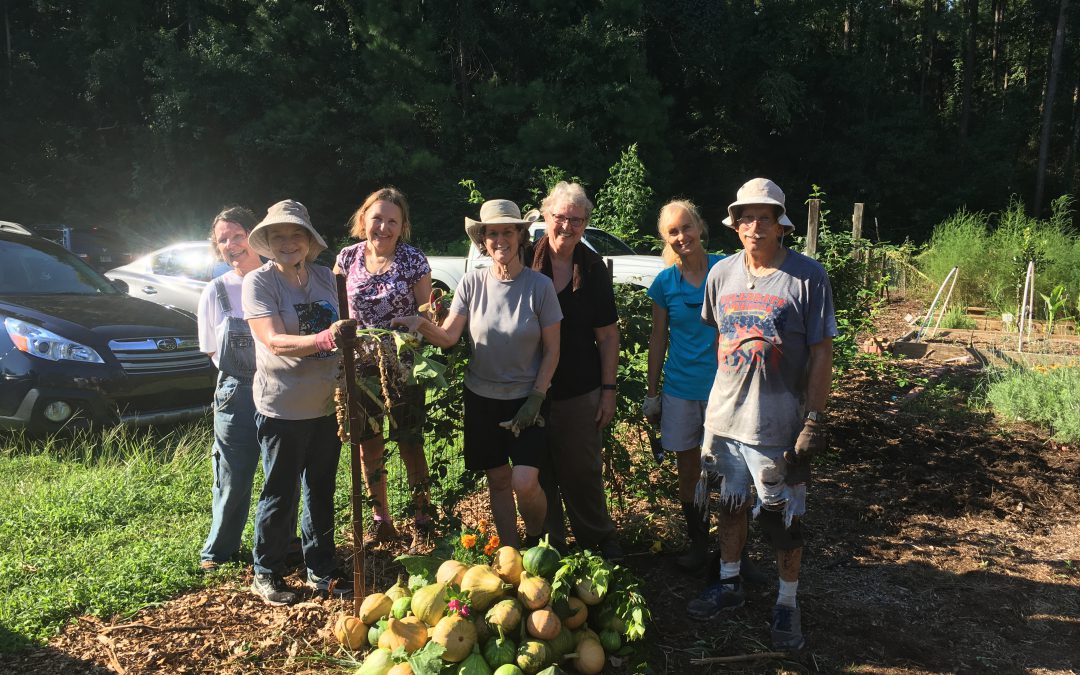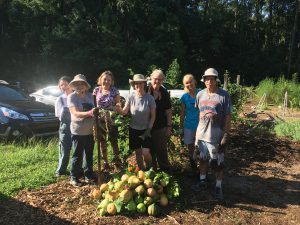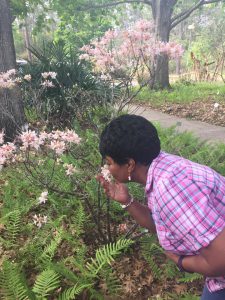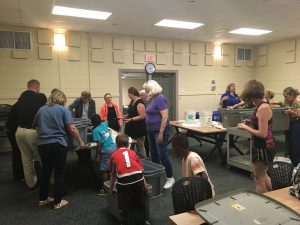
GIP Live Benefits of Turf Program Summary
The May Gardening in the Panhandle Live focused on the various aspects of turfgrass care and species characteristics.
The panel included:
Dr. Bryan Unruh, UF IFAS Extension Turfgrass Science Professor
Sheila Dunning, UF IFAS Extension Commercial Horticulture Agent in Okaloosa County
Josh Criss, UF IFAS Extension Residential Horticulture Agent in Santa Rosa County
Daniel Leonard, UF IFAS Extension Horticulture Agent and Director in Calhoun County
Q: Does No Mow March cause more problems in maintaining a good lawn?
Pay attention to what you are leaving behind. If you have aggressive perennial weeds, that could cause issues later. Also, be aware of what types of weeds. Annual wildflowers may be acceptable that will reseed next year. Mowing before seeds mature is always an option too.
Remember that if there are significant weeds, they are taking advantage of a void in the turf. Find out why the turf is not growing as well and work on that issue. Improve the health of the grass to have less issues with some weeds.
References: https://apnews.com/article/gardening-no-mow-may-lawns-6aa1669b9e9bb5b5d8ea671c44d186f2
Q: What is an unhealthy lawn?
Grass that is not performing at a level that is normal for that turf. Not growing well, does not have appropriate color for the species, thinning out. The difficult part is figuring out why. Could be that that turf is not suited to the site, cultural practices are an issue, pest problem.
We tend to manage turf too much. Take a more minimalistic approach and as needed for turf management instead of a scheduled maintenance plan.
Q: Fertilizer and pesticide inputs aside, can ornamental lawns provide environmental benefits such as carbon sequestration?
Plants remove CO2 and supply O2. Turf areas can reduce temperatures, serve as erosion management and build soil. Also filtering some pollutants. Turfgrass also has huge potential to accumulate and store carbon. Turf has many recreational uses that other surfaces don’t offer and the overall aesthetics of a healthy lawn can improve value of the property.
References: Turf Management to Protect the Environment, https://www.youtube.com/watch?v=w2ajI-t4EoY
Q: What is the best grass for Florida?
You have to match the turf to an appropriate site and turfgrass may not be the best choice for a site. On an urban site, shade from trees will also dictate if turf is appropriate. The best grass for the back yard may not be the best suited for the front yard.
Centipedegrass is a good selection for the case of a grass that grows well with low inputs. It will be a lighter shade of green which is its natural color.
If you prefer to have inputs of fertilizer and water routinely, centipedegrass would not be the best choice. Zoysiagrass is more suited for those who desire a more magazine cover type lawn that is well manicured.
A field type lawn is best with bahiagrass.
Q: Is zoysiagrass the fastest growing market for turfgrass?
There are now good zoysiagrass varieties on the market and better ones coming along.
Zoysiagrass is a very drought tolerant species but it survives by going into dormancy. It survives without water by going from green to bluishgray to brown very quickly. In order to maintain a green, well manicured zoysiagrass lawn, irrigation input is needed.
Q: Can I grow a lawn from centipedegrass seed? How long will it take to fill in?
It takes 3 years to establish a lawn from centipedgrass seeding. That is with minimal inputs but mowing is important in the establishment process.
Dr. Unruh does not recommend seeding into patches because water needs for seed are higher than established grass. Sodding or plugging is better for patching spots.
Q: What is the best choice of grass for a partly shaded lawn/best under a large tree?
Long term, you need a shade tolerant grass such as one of the St. Augustinegrasses or certain cultivars of zoysia (Palisades is one). As the tree grows over the years, grass may not remain suited for that location.
Q: What type of grass would you recommend for a meadow area that would be natural/unmowed?
Bahiagrass is a good option.
Q: How do we encourage bee lawns?
Centipedegrass flowers will attract some bees. Clovers (Red, white, hopclover) in the winter months through spring. Consider your space. May just be small sections or at the edge of the yard.
Q: How often should you aerate your lawn and what is the best method?
Sandy soils can compact. Every other year aeration if you have traffic patterns from vehicles, play, or paths. Use a ½ tine with lots of holes back and forth over the lawn.
Q: How to maintain a healthy lawn in our hot and humid summers?
Overwatering is common. Grass gives signs of needing water such as leaf blades folding in half, a color change, and grass not recovering after walking. Calibrate your system to apply ½ to ¾ inch at each time.
References: Mowing Your Florida Lawn, https://edis.ifas.ufl.edu/publication/LH028
Q: How to measure water volume with an automatic irrigation system.
In a zone, randomly place 10-15 straight edged cans that are all the same size. Run your system for a set time and see how much is in each can. You will be able to see where coverage is poor, just right, and overlapping too much. Measure with a ruler and average out the amount. Adjust your time to meet ½ to ¾ inch.
Each zone is calibrated separately.
Same for zoysiagrass but this grass will show you where your system is not functioning well since it’s response to drought is to go dormant. Still ½ to ¾ inch as needed.
References: Watering Your Florida Lawn, https://edis.ifas.ufl.edu/publication/LH025
Calibrating Your Sprinkler System, https://gardeningsolutions.ifas.ufl.edu/care/irrigation/calibrating-your-irrigation-system/
Q: Do I have to fertilize and apply pesticides to have a healthy lawn?
No. All plants need nutrition and fertilizer is just one source of nutrition. A good soil can provide sufficient levels of nutrients for the lawn. Sandy soils may need supplemental nutrients. Could be from compost incorporated in as well.
References: The Florida Fertilizer Label, https://edis.ifas.ufl.edu/publication/SS170
Q: My yard is a mix of grasses. Is this a problem for fertilizer and watering?
You may need to fertilize differently depending on the needs of the various grasses. If a grass is growing into another, then it is favorable conditions for that grass – sunlight, mowing, water availability. You may have to manage for the one that is doing the best.
Q: Should I bag my mowing clippings for my Zoysia lawn or not?
Generally the recommendation is to allow clipping to fall for a yard that is being routinely mowed. Blades will compost. The exception is with zoysia when thatch is becoming a problem or when you have neglected mowing for a period and clumps of clipping are piled on the lawn.
References: Zoysiagrass for Lawns, https://edis.ifas.ufl.edu/publication/LH011
Q: Is weed control beneficial or harmful?
Improperly used herbicides could have environmental impacts. Follow the label carefully. Manage weeds through cultural practices too.
Q: How do I get rid of crabgrass?
Annual weed that germinates when soil temps reach 55 degrees F. Could be mid-January or a little later. Pre-emergent herbicides can help. Not many options for post emergent weed control.
From Dr. Unruh: We do not recommend Weed and Feed products since timing is different for both. North Florida fertilizer applications should not occur before mid-April.
0-0-7 with pre-emergent would be the only exception. The 0-0-7 is just potassium.
Q: How to detect, kill and prevent ground pearls.
There are no chemicals controls for ground pearls. Thinning out areas. Insects that are in the soil, with pearl stage attached to the roots. Females are hot pink and crawlers.
Maybe something in the future. Try to outgrow ground pearls with faster growing grasses such as St. Augustinegrass and zoysiagrass.
Q: How do you control a heavy infestation of doveweed?
Do not handpull. Annual weed that germinates later when soils reach 70 degrees F. Pre-emergent herbicides. Mow more often and manage irrigation. Improve drainage. Clean mowers too.
Q: Are there herbicides that will not harm birds?
Insecticides have the biggest impact on wildlife compared to other types of pesticides. Many herbicides use a carrier that looks like a grain so water immediately according to label to move chemical off carrier. Follow the restrictions about application close to water. Read the label.
Q: Are all zoysia grasses hard to keep out of landscape beds?
Establish a border with edging to block the growth. Must be buried and above grade as well.
Q: If we’ve lost most of our backyard due to killing off weeds with only some grass left, how’s the best way to start?
For smaller spots, allow surrounding turf to run back into areas. Resodding areas or plugging new grass.
Q: Large sections of my front lawn died last summer and I diagnosed it as brown spot/large patch. How do I address?
Why having large patch – poor drainage and fix that issue. Also zoysiagrass is susceptible to large patch. You can restablish grass but manage so conditions are not as suitable for the disease. Water as needed and nutrients only as needed.
Q: We have a lot of bald spots in our yard that we can’t seem to get rid of.
Diagnosing is necessary – compaction, water issues, fertility problems. Loosen area and make sure water is able to move into soil. Then can reestablish grass.
Q: If your centipede lawn is spotty with a variety of weeds, would it be better to kill the whole thing off and sod with Zoysia?
Centidegrass and zoysia have different pH requirements so may not be as simple as just replacing with new type of grass. Why is centipedegrass not doing well? Soil testing and cultural practice evaluation before considering to replace grass. Current centipedegrass may just need different care to thrive.
Q: What is the best alternative to turf grass?
Perennial peanut is an option as a vegetative cover. It does freeze back in many spots of North Florida. It does creep and there are many cultivars. Edging is necessary.
Sunshine mimosa is an option but it also freezes back. Lyre leaved sage for shady areas.
Silkgrass for drier areas.
Frogfruit for moist areas
Final thoughts from Dr. Unruh
Shut the irrigation off. Most people tend to overwater. Back off inputs to as needed instead of a schedule. A few weeds are ok for most home lawns and lawns can still be attractive.






